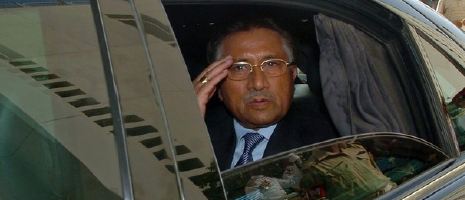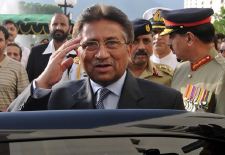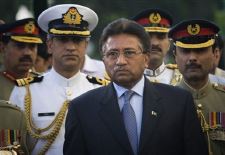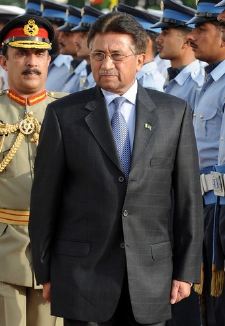Adil Najam
In a nationally televised speech, Gen. Pervez Musharraf, President of Pakistan, has just announced his resignation, pre-empting a move to impeach him by the parliament.
This post has been updated to add news photos from this momentous day in Pakistan’s political history. The pictures speak eloquently of the moods and thoughts of the day. (Scroll down to see the video of Gen. Musharraf’s resignation speech).
Participate in a poll on what might be Pakistan’s future post-Musharraf, here.
![]()
Here is a Pervez Musharraf time-line, published in The News:
August 1943: Born in Delhi, India
1964: Joins Pakistani army.
1998: Becomes army chief of staff.
October 1999: Seizes power in a bloodless military coup, overthrowing the prime minister, Nawaz Sharif. In response, the Commonwealth suspends Pakistan’s membership.
June 20 2001: Makes himself president, replacing Rafiq Tarar, while remaining head of the army. Tarar is forced out of office when the parliament that elected him is dissolved.
July 2001: Holds first meeting with the Indian prime minister, Atal Bihari Vajpayee, at Agra in India. No progress is made because of differences over the disputed territory of Kashmir.
September 2001: George Bush courts Musharraf, asking him to join him in his “war on terror” and help defeat the Taliban in neighbouring Afghanistan. The US president promises Pakistan $1bn in aid.
April 2002: Wins a referendum giving him another five years in office. Observers criticise the referendum as blighted by irregularities.
May 2002: Pakistan test fires three medium-range surface-to-surface missiles capable of carrying nuclear warheads. Musharraf insists his country would not be the one to initiate war.
August 2002: Consolidates his power still further, giving himself the right to dismiss an elected parliament.
October 2002: Pakistan’s first general election since Musharraf seized power in 1999 results in a hung parliament.
November 2002: Mir Zafarullah Jamali becomes the first civilian prime minister since 1999. He is a member of a Musharraf-supporting party.
November 2003: Pakistan’s National Assembly meets for the first time since 1999.
December 2003: Musharraf promises to step down as head of the army by January 2005.
May 2004: Pakistan is readmitted to the Commonwealth.
December 2004: Musharraf announces he will stay on as head of the army.
August 2005: Pakistan tests its first nuclear-capable cruise missile.
March 2007: Musharraf suspends the chief justice, Iftakar Mohammed Chaudhry, triggering a wave of anger across the country and the first joint protests held by the parties of exiled former prime ministers Benazir Bhutto and Nawaz Sharif.
October 2007: Signs a corruption amnesty, opening the way for Bhutto’s return and a possible power-sharing agreement. Within hours of Bhutto’s arrival back in the country, bombers attack a Bhutto rally in Karachi, killing more than 100 people.
November 2007: Declares a state of emergency, rounding up opposition leaders at gunpoint. In the same month, Musharraf quits as head of the army, becoming a civilian president.
December 15 2007: Lifts state of emergency and announces plans to go ahead with parliamentary elections scheduled for January 8.
December 27 2007: Benazir Bhutto is assassinated at an election rally in Rawalpindi.
January 2008: Elections postponed until February 18.
February 2008: The two main opposition parties gain a clear majority in the elections.
August 2008: The two main parties strike a deal to impeach Musharraf if parliament backs the move.
August 18 2008: Musharraf announces his resignation



























































I HOPE THAT NOW HE IS GONE WE CAN PLEASE BEGIN LOOKING AT REAL PROBLEMS OF PEOPLE. LOAD SHEDDING, FOOD, JOBS.
From PPP-PML’s kleptomania, to Musharraf’s delusion of grandeur, a sad epitaph of Pakistan’s two decades of law(lessness) ,(dis)order and (mis)governance.
I’m greatly depressed by the resignation news. How i wish it was all a dream but unfortunately it isn’t. With Musharraf out of the scene now, we can expect only the worst. Musharraf says he hopes that after he is gone the country prospers more. How could he say that?? Doesn’t he know who will come after him and what will become of Pakistan??? What could be worse than this?? After Quaid-e-Azam, Liaquat Ali Khan and Z.A Bhutto, he was the one who tackled each situation brilliantly and never became afraid of the threats. I just want to tell the people who are celebrating now that we all will witness what is to come next and we all will realise how better Musharraf was. Now the country will fall in the hands of hypocrites and God forbid I seriously don’t feel good by the way the country is going and I expect only the worst with this new government.
Soon after September 11, 2001, after Bush made his “with us or against us” speech, I felt extremely depressed because I thought that Pakistan’s survival was at stake. I give Musharraf credit for steering us through those turbulent times. I believe that he did a better job than anyone else could have done. I also give him credit for allowing the media to be opened up, for retiring from the army when he did, for allowing elections to be free and fair, and finally for resigning. Whether he wanted to or not, this is the smoothest transition from a dictatorship to a democracy that we have experienced.
I wish that he had never dismissed the judiciary … 2 years of our country’s history down the drain. I also wish that he had taken a harder stance against militants, done more to partner with our neighbors in controlling terrorism, and had brought the ISI under control. Finally, I wish that he had resigned a lot sooner than he did. I believed and still believe that he was the first person in a long time who thought about the betterment of the nation more than anything else (whether you agree with his actions or not)
As a people, based on the comments on this thread, we tend to think only in black and white. Our leaders can either do no wrong (the “best leaders ever”) or deserve to be hanged. We get the leaders that we deserve.
My plea to you all is to think hard about what you want in your leaders, and then hold yourselves and them accountable. Otherwise we will always dance in the streets evertime a new leader comes and then again when that same leader leaves.
Aliya- agree with your sentiments somewhat but lets keep God out of it…the degree of inclusion of that entity in state affairs has led us partly to where we are now
Qasim:
– Is it possible that anti musharraf hysteria is primarily a result of reaction to rampant inflation, economic woes and people just seeking a “face” to blame.
-not to get into a chicken and egg argument about which came first but our experiments in democracy are nothing to write home about either
-perhaps you’ll be vindicated by Zardari and Nawaz this time around?:)